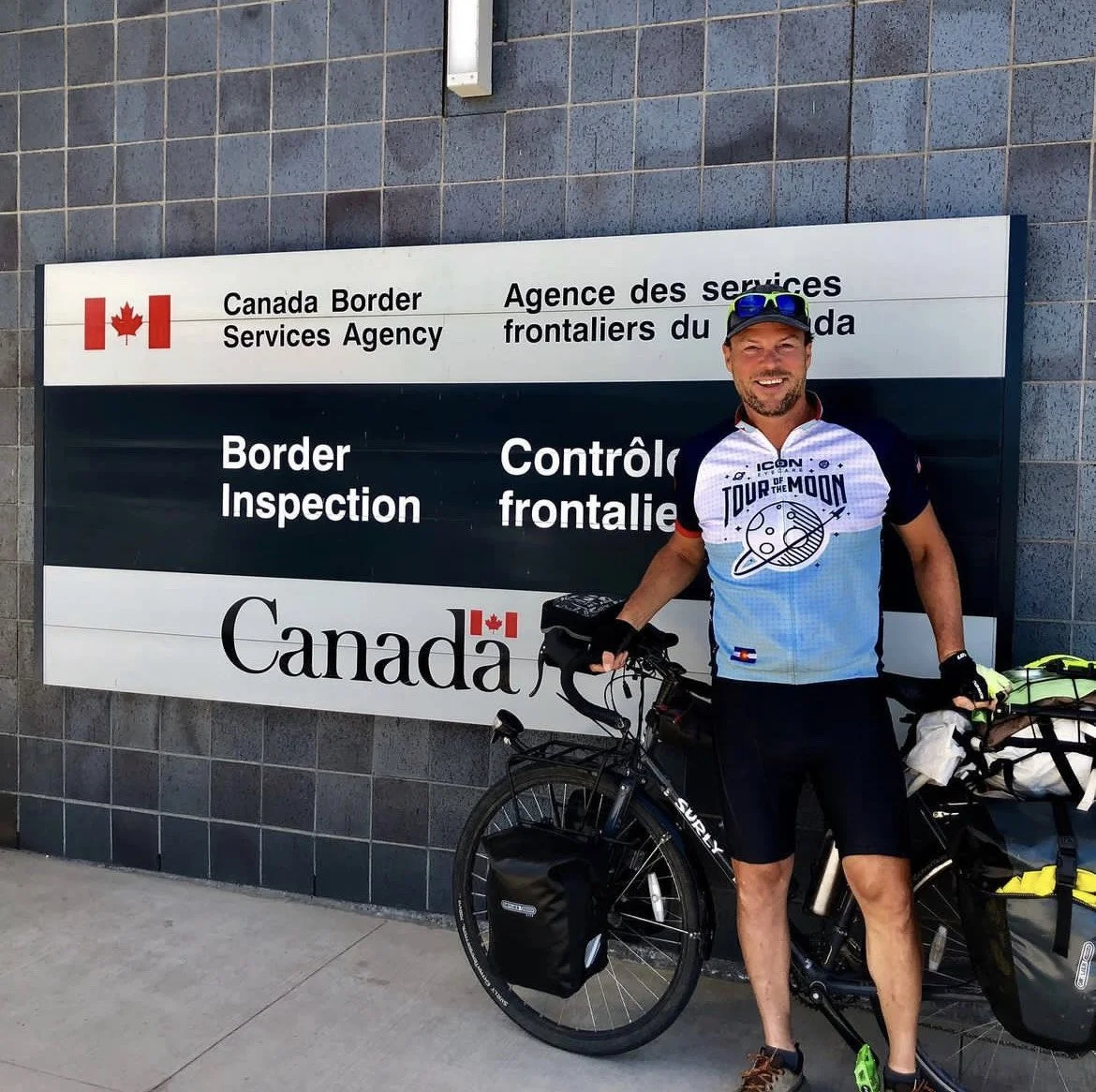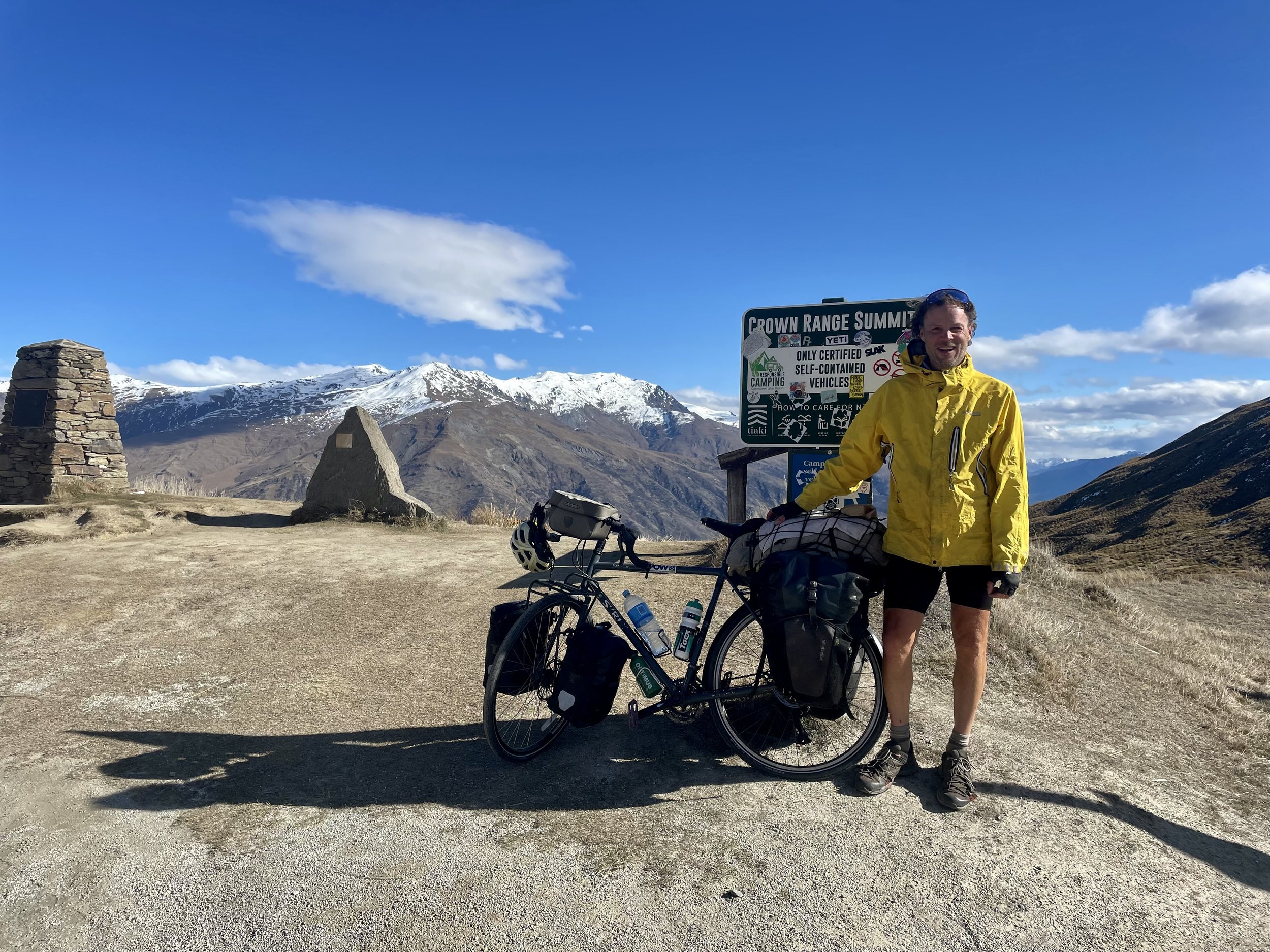Biking the Blue Marble: Ted Eliason Circles the Earth Solo by Bicycle. Here's What he Shared With Lost Worlds...
It’s not easy to reach a man who’s on day 936 of a bike trip around the world. Lost Worlds’ Founder, Dave Hamme, caught up with his former classmate and friend of 30-years, Ted Eliason, between continents for a quick Q & A on day 913 of his extreme excursion. At the brewery, our mantra is “Find Your Adventure.” Ted is doing just that and today he’s back in the saddle, riding through Oceana: Bancock to Auckland according to his Instagram @bikingthebluemarble. Here’s a peek into his pedal-worthy journey — what sparked the mission and what’s next for this adventurer…
1. What inspired you to bike around the world?
The person I blame the most is probably Reinhold Messner. I started getting into ski mountaineering after college and read several of his books on climbing 'Alpine style'. I was awed by his boldness as the first person to climb all 14 of the 8000m peaks in the world and to summit Everest alone without supplemental oxygen. It started me down my own path of unwise solo forays into the mountains, and fantasizing about a future life of working to fund my own climbing expeditions.
My wife and I (still, improbably, married) have now climbed mountains together all over North America, in the Andes, and in the Alps, but still never in the Himalaya. I had a recent career window where I thought it was finally my time to take a shot, then balked at the prices. Himalayan mountaineering is now a big, lucrative, heavily permitted, substantially de-risked tourist business with no more no guarantees of success than when it was a mostly do-it-yourself operation. I have friends who worked two jobs, spent tens of thousands of dollars on credit cards, taken their shot, and still turned around at camp 3 or 4 due to poor conditions; an experience I can relate to from my own failures in the Peruvian Andes and Lofoten islands of Norway.
I had been casually following long-tour Canadian cyclist Iohan Gueorguiev on YouTube and Swedish cyclist Fredrika Ek on Instagram, and started to rationalize that some of my favorite travel experiences simply used climbing as a pretext. I equally loved the travel that surrounded the climbing. So I asked myself: would I be satisfied surrendering my (youthful) Himalayan dreams to spend probably the same money traveling around the world for 2-3 years on the cheap by bicycle? I've always been a Carl Sagan fan and I found an enormous appeal in the idea of feeling the size of our small rock floating out in space relative to my own bodily efforts to get around it. And in retrospect...I will always take that deal: a large portfolio of the obscure over a single shot at the penultimate.
2. How long have you been traveling?
Today is day 913. I started off from my garage in Colorado and made it out to the Black Sea coast of Bulgaria (highly recommended) before the Covid lockdowns. I spent three months in Bulgaria before feeling forced to fly home. Once home I cycled a western states loop up to Glacier Montana, down the west coast, and then back home from Tijuana, at which point I felt the need to save money and wait for border restrictions to lift. I re-started two Aprils ago in Greece, south of my endpoint in Bulgaria, and have cycled out to New Zealand since.
3. How far have you traveled?
I just passed the 60,000 km mark (36,000 miles), which is about one and a half times the circumference of the equator. New Zealand is country #39 of the tour. Obviously, I'm not going around the world in a very straight line.
4. What is the most amazing location you have seen? Why did you pick this location?
Heaven on Earth for me was Leh, Ladakh India. It was everything I dreamed the Himalayas could be. A James Hilton Shangri-La. Mountains beyond a scale I could ever have imagined. A quality of light and sound like soft temple gongs and prayer flags in the wind. Street yaks, street cows, fluffy brown street dogs, white stupas, ornate rolling prayer wheels, Bhuddist monks in Burgundy and saffron robes, Punjab Dhabi with wood fired chapati at all you can eat for $1, luxurious Thukpa noodle soups in steaming cafes. A place apart from time and the world as we know it. A place to me with a sense of mindfulness within time and the universe.
5. What cuisine have you most enjoyed? What's the craziest food you have eaten?
Every day Malaysian food is imo the best in the world. I now see Malaysia as a long multi-ethnic sprawl of interconnected high volume cafeterias where eating is a sport; everything from succulent Penang red curries to authentic Chinese noodles to indigenous Malay plates and even great western food. Prices can run from $2-$5 a plate. In terms of flavors, variety, diversity, affordability, inventiveness, openness to innovation, I'm hard pressed to think of any better place to enjoy everyday food. And this is a tough call for me. I've made 17 trips to New Orleans, love France, Italy, India, Mexico, Quebec, Vietnam, Spain.
The craziest food experience was probably in a small town in Cambodia where a Pol Pot survivor showed me the correct way to 'palate cleanse' between bites of roasted grub and slurped breakfast soup noodles. But I loved the intense locality of that experience.
6. Can you give us your routine day? What's the most challenging part of your day?
I wake up at daybreak, no matter how long I stayed up the night before. No alarm. I look at my phone until I feel I've wasted too much time and need to get moving. Preferably, the sun is hitting the tent. I try to dry out the tent as best I can, pack up the bike, see how far I want to go for the day on an app: where are the breaks? are there things I want to see? where is a probable stop for the night? And then I pedal. I get in a zone pretty quickly. I let my head drift. I really don't plan ahead very far or worry too much. I figure out the basics of new countries in about 3 days: where to get food, weather, the prices, where to sleep. I usually cycle 6-8 hours a day. I spend a lot of time calculating back and forth between kilometers and miles. I try to avoid riding after dark. Some nights I read in my tent, some nights I do social media, some nights I socialize if I'm around people who are open to that, and periodically I FaceTime with family. The longest I've been without a shower is 7 days. I can almost always find a shower (or a river), a plug, a WiFi connection every few days if I really need one. There is no 'most challenging' part to any one day. There are some really challenging days, some easy days, a few rest days. The long process of such an extensive trip reminds you that the conditions of your worst day will be completely different within four more days. The weather, terrain, even people and food, seem to vary every 300 miles or so across the globe. Challenges are always brief and always tied to a context that will change. I try to remember this in moments that are intolerable, or spectacular for that matter.
7. What has been the most interesting/exciting moment of your trip?
I was pretty excited after an evening in Quebec when I was invited over to a campfire in which only one person in the group spoke a little English. After only a month of cycling across Quebec I had been so immersed in French I could understand the group's questions and could participate in their conversation. I had studied eight years of classroom French and still couldn't speak it well enough to spare the French their trademark impatience. But as I got deeper into Quebec, staying with people along the way, my French dramatically improved. I'm still mystified by the brain's ability to convert what sounds like rapid babble into discrete words, sentences, and meanings purely through immersive exposure. And profoundly impressed by the need to immerse to master any hard skill with fluency. What is worth giving up everything to spend 10,000 hours practicing? I think, by default, I've probably given up 10,000 hours wondering what is worth 10,000 hours.
I had a morning in cruise-mode circling the flat shores of the Bay of Kotor, Montenegro, this tiny country between Croatia and Greece. It's like a Norwegian fjord that got lost somewhere in the ancient Balkans. Steep mountains that rise up on all sides in golden sunlight. The surrounding architecture, a pastiche of Byzantine Roman orthodox and 15th se Venetian. The surface of the bay in the early morning hours is as reflective as a glass mirror and boats seem to hover in mid air between reflections of golden castles and orange-tiled orthodox churches. I was aghast at the beauty of that morning.
What I've found most interesting is this dichotomy that most people I meet in the world (outside of the main tourist zones) are as friendly to a visiting traveler as they would be to any long lost relative. Yet the backdrop often contains historical, and in some cases even present, elements of the horrific. Regular people across the world are far kinder, safer, friendlier, more generous than I ever imaged. And history is sadder. I've felt moved by so many things. The Taj Mahal in the early morning fog, a stolen first hour in the Uffizi gallery on an off-season morning in Florence, that golden ride around the Bay of Kotor, every family that has ever randomly invited me into their home and fed me with what they had and asking for nothing in return--a particularly common occurrence in the Muslim world. There are so many good people out there, so much beauty worth living for, savoring, passing forward. And yet, still, so much ugliness. Selfishness, ignorance, and indifference behind the scenes. Darker forces that it's hard not to feel pessimistic and helpless about. And often, the friendliest places are the ones that have seen the worst of times the most recently.
8. What's next for you?
From Auckland I fly across the Pacific to Santiago. Officially completing 'around the world' by the longitudes. But I plan to meander on my way back home. I picked up Spanish with some fluency during my often turbulent career, and would very much like the life-experience of feeling so immersed in Latin Spanish that in moments I forget I'm a native English speaker. Eventually when I make it home, I expect (hope) to find some paid work, finish typing out my blog, complete a digital book, as much for my own benefit as anything--but also with a sense of obligation to share the best of what has been a tremendous privilege of travel. And I also hope at some point to launch out on one more full year on the road, cycling the 'gap in the map': through the Middle East and Africa. I think after that I will be better able to commit to smaller trips, and will probably always be accompanied by my wife, Kendra, who misses me terribly, but who was smart enough to insist after this Covid stuff that I get back out on the road and finish what I started.

















